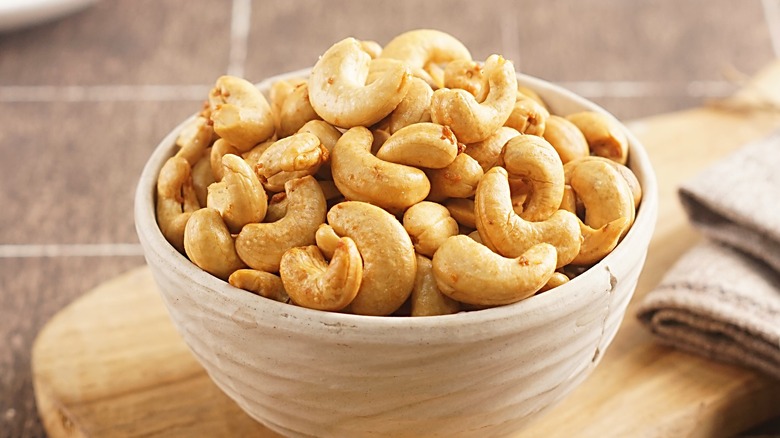When You Eat Cashews Every Day, This Is What Happens To Your Cholesterol
Nuts can make your heart healthier because most of their fat content comes from unsaturated fat. Even the Food and Drug Administration allows food labels to claim that eating 1.5 ounces of nuts a day as part of a healthy diet may reduce your risk of heart disease. However, even though you'll find legumes such as peanuts and seeds such as almonds on this list, you won't find a can of cashews with this health claim on the label. That's because cashews have more saturated fat for a 50-gram serving than allowed by the claim, and the American Heart Association says too much saturated fat is linked to high cholesterol.
It's not that cashews are high in saturated fat, however. A 50-gram serving (less than 2 ounces) of cashews has 4 grams of saturated fat, which is at the edge of the FDA's limit. Also, 40% of the saturated fat in cashews comes from stearic acid, and a 2005 meta-analysis in Lipids found that stearic acid can lower LDL cholesterol. If you add cashews to your diet every day, you might find an improvement in your cholesterol levels.
Cashews might improve cholesterol, but findings are mixed
In a 2017 study in The American Journal of Clinical Nutrition, 51 people with high levels of LDL cholesterol ate either cashews or potato chips for four weeks as part of their everyday diet, then consumed the other snack for another four weeks after a two-week break. When the people consumed the cashews, their total cholesterol dropped on average by 3.9%. Their LDL cholesterol and non-HDL cholesterol also decreased by 4.8% and 5.3% respectively. Although there weren't any significant changes in people's triglycerides or HDL cholesterol levels, eating cashews also lowered their total cholesterol-to-HDL ratio, indicating a healthy improvement in their lipid profiles.
However, a 2019 study in The American Journal of Clinical Nutrition conducted a similar study but didn't have its participants consume potato chips. This study didn't find that cashews affected cholesterol, blood pressure, blood glucose, or any other risk factors for cardiovascular disease.
Cashews might raise HDL cholesterol in people with type 2 diabetes, according to a 2018 study in The Journal of Nutrition. For 12 weeks, 300 people either followed a diabetic diet or a diabetic diet that substituted 30 grams of cashews for equivalent carbohydrate calories. Those who ate the cashews had seen a slight but significant boost in their HDL cholesterol while lowering their systolic blood pressure.
Cashews have other health benefits, however
Even if cashews have no or little effect on your cholesterol, certain compounds in cashews have other health benefits, according to a 2023 review in Food Frontiers. Anacardic acids have been found to kill breast cancer cells and block proteins that keep cancer cells alive. These same acids might also help manage diabetes by moving blood sugar more quickly into your muscle cells. Substances in cashew nuts might help protect the brain and block enzyme activity linked to Alzheimer's disease.
One ounce of cashews provides 5 grams of protein, and the protein from cashew nuts could also protect your brain from a stroke. Antioxidants in cashews can protect your stomach lining while protecting your digestive system from harmful enzymes and bacteria. Cardol and anacardic acids also can fight off antibiotic-resistant bacteria such as methicillin-resistant Staphylococcus aureus (MRSA).
Although the cashew apple is often wasted, a 2023 article in JSFA Reports says it might be a good fruit to add to your diet. Cashew apples are loaded with vitamin C, polyphenols, and anthocyanins that have anti-inflammatory and antioxidant benefits.



